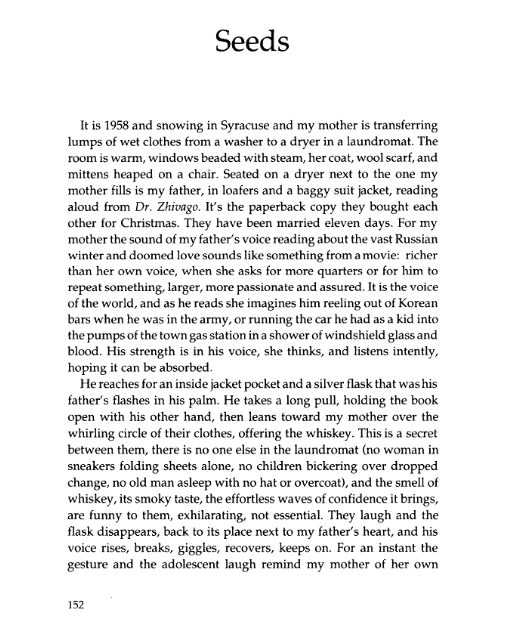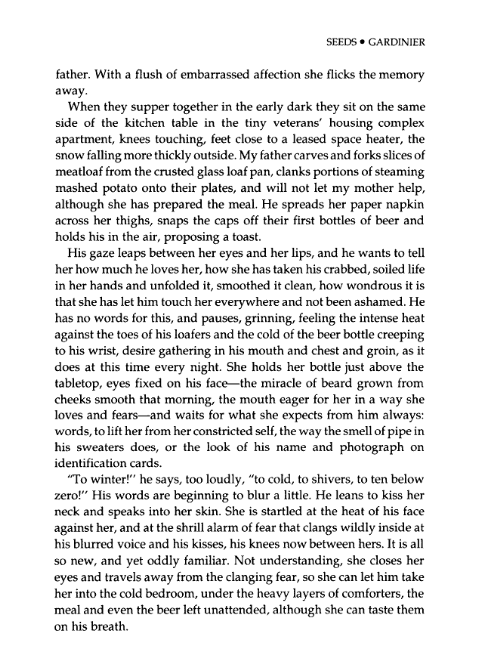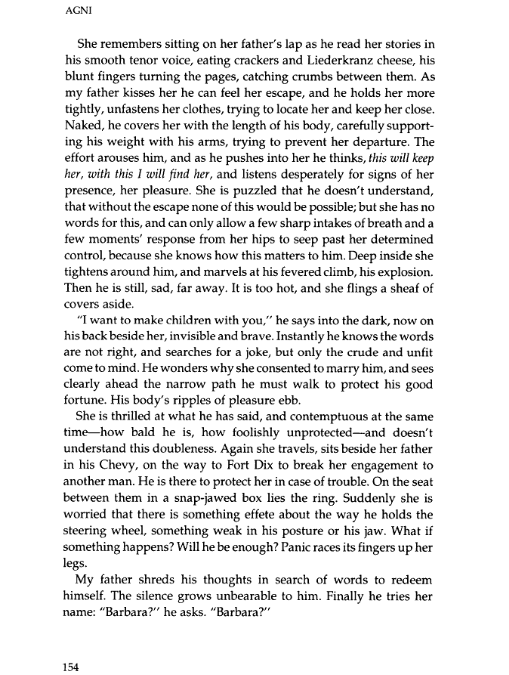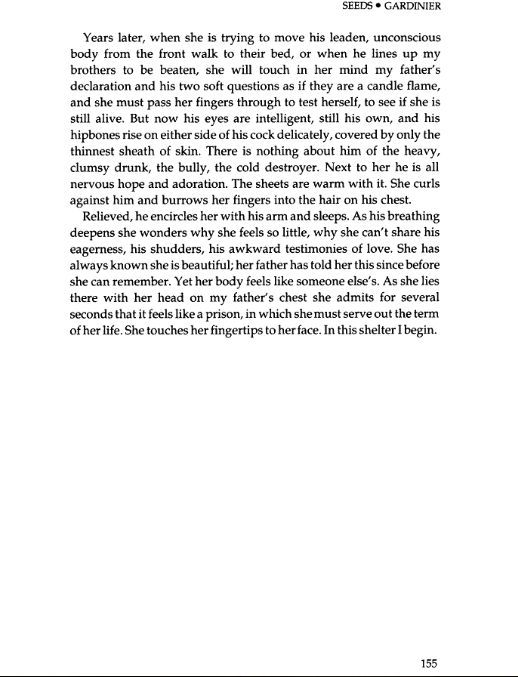S T O R I E S
Nablus
I was born in Nablus, and I’ve never been there; my sister and her family live in Nablus but have no permits to enter, and my two younger brothers are on the lists, hence unauthorized in Nablus and elsewhere. The permits to enter Nablus are available only within Nablus, at an alley doorway near the manara[1], where a flyer is posted some Thursday mornings listing the available permit application times for the previous week. The permits to leave Nablus are available at the second barrier on the road leaving the city, a road on which only those not associated with Nablus are permitted to travel. When my daughter asks, Where is Nablus?, we’re sometimes walking through the qasaba[2], which is now a clearing, while various inexplicable things are happening, and sometimes walking in the rain through ravines that lead to Nablus, trying to find a way in; in either case, it’s difficult to know what to answer.
You may have heard that Nablus is teeming[3], as the rivers of Northamerica teemed with fish before the Europeans came; somewhere an Englishman has written that the fish teemed so thickly in some river he could have walked across dryshod.[4] This always puzzled me, because the fish themselves would have been wet, as beings are wet, as anyone living in Nablus could tell you; so even if the Englishman had walked only on their bodies, dryshod he would not have been--unless the fish were already gutted and salted and dried and packed for export, which maybe they were in the Englishman’s imagination, which may account for my confusion.
Teeming is not the word that comes to mind if you stand in the center of Nablus (but where is the center of Nablus?), in the qasaba as qasaba or in the qasaba as clearing, noticing the presence or absence respectively of members of various families you know--the Son-of-the-Messengers, the Olives, the Caravansaris, the Beloveds, the Smiths and the Glaziers--and the presence or absence of various strangers, because Nablus is a city, which means there must be families and there must be strangers, and terms on which they live together. And teeming would certainly not come to mind if one arrived at the time of a closure, when the little barbershops are not teeming nor the stacks of what lettuce has been able to make its way in nor the newsstands nor bakeries nor the stalls of sweets or soap; Nablus is quite well known for its sweets and its soap, and what a lot of the former we need under the current arrangements, and what a lot of the latter we’ll need at the end of them. When the time comes to wash Nablus, the workers at the soap factory which is now a clearing will be exhausted, as the bakers and the smiths and the glaziers are now; they’re exhausting, these occupations. So not teeming, but patterned, maybe. Sweetened by bakers. Unsoaped. Exhausted.
I would tell you my sister’s name as she says it, but you would hear something else; so believe me when I say her name means She Who Rides the Jeep, roughly translated, leaving out the nuances of valor and tenderness in the sounds of the original words. My brothers’ names are Soap Wrapper and With the Memory of an Olive Tree, this last with the undercurrent of Unfortunate One. You may also have heard that Nablus is a hotbed[5], an impression I may contradict when I tell you the pleasure of a soft jacket while walking the damp streets of Nablus or sitting in damp rooms made of stone--or when I give you my brothers sitting around a brazier with other young men with scarves around their necks. Maybe they’re discussing women; maybe they’re discussing the Authority; maybe they’re discussing money and the mystery of how to obtain it, as only a little employment is permitted in Nablus, and employment outside Nablus requires an application for a permit which may only be obtained at the second barrier, which is off-limits if you are in my brothers’ situation. They are not discussing school, as the schools are no longer authorized; so maybe they are planning something, as the listmakers like to suggest, although it is very difficult to plan anything in Nablus, as may already be clear. Thinking about the future is something children do--When can we go out? Where is my birthday? Will the soldiers make that noise again? If they do, will you stop them?--before the curtain of the current arrangements is fully installed behind their eyes. My brothers are no longer children; so if they’re sitting around a brazier planning something, that in itself is a kind of resistance, and brings us closer to the new arrangements, when the soapmakers will be tired--unless of course what they’re planning cements the current arrangements more firmly in place, in which case they may share the Englishman’s confusion.
There are many confusions in Nablus, as might be expected--for example, between the qasaba as qasaba and the qasaba as clearing, or between the manara as crossroads of conversation and tryst and nourishment and the manara as crossroads for dead boys who may or may not be from Nablus bleeding into the white pavement stones. This may point to a broader confusion between matters of construction and of destruction, and for detailed illustration I would encourage the curious to visit Nablus and see this confusion written on the surfaces of the city, like one letter written on top of another by many hands for many years, since as I may not yet have mentioned Nablus is an old city, which means its records have been kept less by winds and waters than by human hands, so it’s been a kind of laboratory of the work of human hands for quite a while now.
As you may know, we had our own Englishmen in Nablus once[6], and one of those blurred letters describes them; it was written by my grandmother and then written over by someone else, so it arrives like the sounds of someone speaking through water. In the water speech the Englishmen arrive at my grandmother’s house at three o’clock one Thursday morning and ask with their boots and batons where my grandfather is, besides on their list of revolutionaries, which to my grandmother means Someone Thirsty for the New Arrangements and to the Englishmen means Thief. In addition to his name they want his body, and my grandmother cannot or will not provide it; so they order her out in her sleeping clothes with my infant mother in one arm and my aunts and uncles pressing her knees, preoccupied with the future, and my father’s deaf mother and her sisters and their husbands and children’s children, and plant explosives made in Scotland in the kitchen and the bathroom and the bedroom where my mother was born, and make the house a smoking rubble to correspond with dawn, with a noise and a smell familiar to all those who live in Nablus. In my grandmother’s letter the Englishmen’s eyes are teeming. In her free hand is a key.
Many keys live in Nablus, as in any city; but in Nablus they often belong to doors that no longer exist, in Nablus or elsewhere. The banks are like banks anywhere, except that masked soldiers may arrive unexpectedly and herd the employees into one room and help themselves to the deposits. The baths like other baths have disks of glass in the ceiling, so circles of sunlight travel across the wet bodies, across the wet floor; but then an Apache from Chicago or a Caterpillar from Peoria or a Falcon from Sunnyvale or a Merkava from Tel-HaShomer may remove the ceiling entirely, and the old dressed stones will be replaced by cheap cinderblocks quickly, at the exhausted hands of the members of the exhausting occupations.
I have never been to Chicago, or Peoria or Sunnyvale or Tel-HaShomer; I’ve heard that Jaffa smells of oranges and the sea, and I’ve held keys that belong to it, although I’ve never been there either. I’ve heard that Washington is on a river, and that the man Washington once crossed a river standing, and that one of his names was Breaker of Towns, and that when his teeth failed they were replaced by the teeth of one of his slaves, the most exhausting and exhausted of occupations. Washington is also a university that is a sister to the university in Nablus; at one point they were studying 19th Century Northamerican Literature together, including Mr. Whitman’s auctioneer who didn’t know his business, and Miss Dickinson’s My Life had stood--a Loaded Gun--, and Mr. Melville’s Captain and his teeming eyes. I heard reports on the lectures in the clear voice of the young woman who gave the news on the radio station, before the sisterhood was terminated and the university closed and the radio equipment dropped from high windows and the young woman lost in an ambulance delayed at one of the barriers.
But we have come partway into one of the rooms of the new arrangements, in which the story is not permitted to end with Nablus razed under columns of smoke; instead we have the confusions mentioned earlier, which find the threads in the woven patterns of Nablus and pull them, until we have not only the soldiers fighting the houses and the radio stations and the grandmothers but the Authority fighting the revolutionaries and the mayor’s partisans fighting the governor’s and the Son-of-the-Messengers fighting the Caravansaris on Thursday mornings in the middle of the street. The people of Nablus sleep in their clothes and smoke too many cigarettes and lean their foreheads against the old stones to ease the confusion of dusk when the qasaba made a clearing made a qasaba is destroying itself, becoming rinds and stems and wrappers and wet boxes and people hurrying behind shutters and locks that may or may not become smithwork by morning. When the soldiers come it’s called an operation[7], an operation on the body of Nablus, another term that reflects the Englishman’s confusion, which has infected all of us by now, I’m afraid.
To leave Nablus, one must appear at the second barrier the previous week with 1. an original birth certificate containing no place names, 2. a name that appears on no list, 3. a notarized certificate of political impotence, both sexes, and 4. three photographs: 4A, the applicant’s father kneeling at a barrier; 4B, the applicant’s grandmother standing outside in her sleeping clothes; and 4C, the permanent alien non-resident applicant, seen as a shadow against a stone wall along one of the perfectly good streets of Nablus, if only the troublesome human beings could somehow be removed.
My sister who once had another name was removed from her house one ordinary morning and attached by one handcuff to the back of a Jeep; one soldier drove through the streets of Nablus and one aimed his Northamerican rifle at my sister and one held his hand over her free hand with a loudspeaker in it. “Where are you, my husband?” the soldier said, and elbowed my sister and made her repeat it, and “Please come home and give yourself to the soldiers,” and “If you don’t, let the price of us be on your head.” But when my sister repeated the soldier’s careless sentences she added barely audible suffixes and consonants and the particularities of her regional accent and the untranslatable valor and tenderness mentioned earlier, so the empty streets of Nablus and the people shuttered beside them heard something like, “Where are you, my revolutionary? Don’t answer,” and “Please shit on the proclamation and give it to the soldiers,” and “Our names are written behind your eyes and no one can touch them there.” For this reason she was called She Who Rides the Jeep, as opposed to She Who Is Ridden By It.
My sister is irremovable from Nablus, as are the braziers heating the bitter coffee, the courtyards of blossoming oranges and the courtyards of dust, the jasmine and Mr. Whitman’s sisters, death and night, washing again and ever again--and their brother Ayub, from the Suad Surah, whom you may know by another name[8], who heard in his torment, “Here is a cool washing-place and a drink.”
[1] manara 1. city center 2. lighthouse.
[2] qasaba 1. city center 2. old city 3. market 4. citadel. The verb form refers to stonecutting.
[3] teeming 1. abundantly filled with living things. See Captain Joseph-Elzéar Bernier’s address to the Empire Club of Canada, “Our Northern Heritage,” 1926: “This slide shows a house that was built for the police. Since 1922 we have been supporting police on these islands in order to maintain our rights, and I must congratulate the Government for that action. The time has come when we have to secure this territory for our children, because it is teeming with wealth, like the northern part of Ontario and Quebec. We have already established our claim to a vast area of land rich in large deposits of coal, iron and copper, and with a possibly large revenue from fishing, whaling and trapping. As we get towards Hudson Bay we find there is a great deal of wealth, and every month of the year we hear of ore being found, gold mines and copper mines.
“In the place shown in this picture I found English money. It had been deposited in a cache during the voyage of McClintock. This next picture shows the piano, and me coming down from the bridge as they are playing God Save the King while waiting for others to come to the table. This picture shows the Maclaren cheese and the Christie-Brown biscuits. I am giving natives the biscuits. Now comes the Doctor, and he is waiting to draw teeth of the natives, and I am keeping them in good humour.”
[4] dryshod "Other places have greater quantities in so much as wagers have bin layed, that one should not throw a stone in the water but that he should hit a fish. I my selfe, at the turning of the tyde, have seene such multitudes passe out of a pound, that it seemed to mee, that one might goe over there backs drishod. These follow the bayte up the rivers and sometimes are followed for bayte and chased into the bayes and shallow waters, by the grand plise; and these may have also a prime place in the Catalogue of Commodities...” Thomas Morton, Massachusetts, 1637
[5] hotbed 1. An environment conducive to vigorous growth or development, especially of something undesirable: a hotbed of sedition. 2. A glass-covered bed of soil heated with fermenting manure or by electricity, used for the germination of seeds or for protecting tender plants.
[6] Englishmen “Beginning on the 19th June, certain areas in the Old City of Jaffa on the hill overlooking the Port were demolished. These house demolitions were carried out by the Army after notice to evacuate had been given to the inhabitants involved, to whom the Government promised compensation. Those who became homeless and destitute were given relief.
“The operations were carried out without loss of life, and in all 237 houses were demolished. As a result, not only has public security been greatly improved in a quarter of the town where, on account of narrow difficult streets and lanes, police work had always--and in particular during the disturbances following on the outbreak of the 19th April--been notoriously difficult, but also two wide streets which by the end of the year were open to traffic, have been created which will improve public health conditions and contribute both to the commercial and residential amenities of the town.” (Report by His Majesty’s Government in the United Kingdom of Great Britain and Northern Ireland to the Council of the League of Nations on the Administration of Palestine and Trans-Jordan for the Year 1936)
[7] operation “This type of combat cannot be avoided. The makeup and distribution of smaller built-up areas as part of an urban complex make the isolation of enemy fires occupying one or more of these smaller enclaves increasingly difficult. MOUT is expected to be the future battlefield in Europe and Asia with brigade- and higher-level commanders focusing on these operations.” (Department of the Army, Field Manual 90-10-1, An Infantryman’s Guide to Combat in Built-Up Areas, 1993)
MOUT: Military Operations in Urbanized Terrain
[8] another name According to one narration the number of prophets is 124,000, but the Qur’an mentions only 25, namely Adam, Nuh (Noah), Hud, Salih, Ibrahim (Abraham), Lut (Lot), Ismail (Ishmael), Ishaq (Isaac), Yaqub (Jacob), Yusuf (Joseph), Shu'aib, Yunus (Jonah), Ayub (Job), Musa (Moses), Harun (Aaron), Daud (David), Sulaiman (Solomon), Zakaria (Zachariah), Yahya (John the Baptist), Elias (Elijah), Dzulkifli (Ezekiel), Elisha, Idris, Isa (Jesus) and Muhammad.
Sacramento
Originally published in Fiction international 42: The Artist in Wartime
The soft chalk in the fingers of the young man drawing portraits near the Plaza sifts onto the knees of his jeans; he’s leaning toward another young man, they’re soldier age, but instead of killing or dying at the moment they’re sitting across from each other at the corner of 59th Street and Fifth Avenue on a late Saturday morning in December, and one is drawing the other’s face: one piece of soft chalk for the dark closecropped hair, one slightly different for the angled brows, one for his eyes, one for his lips, one for the color of his skin.
The subject keeps his eyes and lips like a soldier’s, and a young woman standing behind The Faces Man is making faces but in a different way, grimacing and laughing and sticking out her tongue, trying to get her soldier who is not a soldier to lose his composure, one of her favorite things--one of his favorites too, but he pretends it’s not, the life she makes in him complexifying his stare so The Faces Man has a hard time knowing what to do with it, and the mouth, corners reined but up, with that tamped joy, or straight across?, the mouth with which the drawn man is saying as if made to by a ventriloquist, or is he the ventriloquist, to the woman he loves, “I’m going to kill you.”
They’re visitors, you can tell by the fact that they’re paying The Faces Man, by the way they walk on the crowded sidewalk as if they’re the only ones on it; they’re from Beauville, from Belle Reve, from Sacramento, and they can’t get across 59th Street to do their Christmas shopping--he with his hands in his pockets, she with his portrait under her arm--because a lot of people with signs behind blue police barricades are standing in the middle of the street not saying anything. The visitors stand in their place at the edge and the people with signs in their place in the center, and then it’s noon and the sign people start walking, down the middle of Fifth Avenue, and they start to count, 1, 2, 3, 4, 5.
The sign people in front of the visitors are teachers, their signs say this; they’re from here, they walk together with the irritation and attunement of a flock in flight, 6, 7, 8, “Why are they counting?” the young woman asks the young man; from the street they can hear the angry numbers and from the sidewalk behind them, as they pass the portraits of Leonardo Di Caprio and of Lakshmi with lotuses, one arm around the neck of a cow with enough milk to feed the whole world, someone is cutting carrots on his knees, singing the praises of a vegetable peeler from Switzerland, “Stainless steel! It will never rust!”, and the price, and The Faces Man calling out his prices, 9, 10, and on some of the signs a face, like and unlike the one under her arm, a young man’s face.
The teachers are from neighborhoods called Manqué and Por Qué and Sabiduría; they look tired, women old enough to be the mothers of the visitors and of the young man whose face they’re holding, 11, 12, 13, 14, passing the ages of the children they teach, and under one of the portraits are more numbers, two dates, one that corresponds roughly to the year the visitors were born, and one exactly to the year just coming to an end, so the visitors know the young man they’re marching for is dead. He’s dressed in a suit, the crisp white shirt and the knot of his tie, he could be going to a club or to church; 15, 16, 17, 18, he’s old enough to be somebody’s father now, 19, 20, 21, 22, 23, and the numbers keep on so the visitors know they’re not counting out his age. They’re up to 34 and they’re not finished yet. The blue barricades are edged by police officers of various genders dressed in various costumes, keeping their eyes and their lips fixed like the visitor tried to; and as the visitors drift around the edge of the corner parallel to the teachers, one woman dressed for church turns her face to one of the flanking officers on the other side of the barricade and unfixes her lips, 40, 41, 42, to spit on the ground in front of him.
He looks startled and stricken, darting his eyes sideways to see which of his colleagues has seen; while his face registers the woman, who could be his mother, his hand trained to register enemies moves to his gun. Yes, yes, the teachers nod, watching the gesture, That’s how they do, and yes for the woman who spit not on the policeman, who’s protecting them at the moment from the traffic and the visitors’ hostility, but on the divided strip of the city between them.
43 and they swing out of the shadow of 59th Street into the sun, 44 and onto the avenue of decorated plate glass and parcels and visitors and not-visitors walking as if they were, 45 and they pass the bronze man kneeling with the world on his shoulders, and as she’s scanning for a crosswalk the young woman visiting sees one sign with holes instead of a face, a target, like at a firing range, did they use chalk to make the black around the edges, black dust, concentric circles of holes, each with a number, 46, 47, there are fifty, and a sign with the young man’s portrait beside.
She doesn’t see any sign with the holes and the young man’s face superimposed, or pressed to the pavement at four in the morning by the shoes and spent shells of the police officers paid to protect him; and she doesn’t see the woman her age the young man will not marry now, walking far at the front, nor the young man’s mother nor her fixed face’s fury, dressed for the sacrament; but she sees the set of the policeman’s jaw in her lover’s jaw and brushes her fingers there to protect him, the jaw for which The Faces Man would have to use one chalk like chestnut for the policeman and one like the inside of an acorn for the young man from Belle Reve--and one like cinnamon for the teacher, and one called Sabiduría for the young man not walking at the front with the women, the dust of it all over the winter streets, a speck of it at the edge of the eye of the visitor with the portrait under her arm, and she brushes it away.
for Sean Bell, 1983-2006
Originally published in Agni , No. 27, 1988





